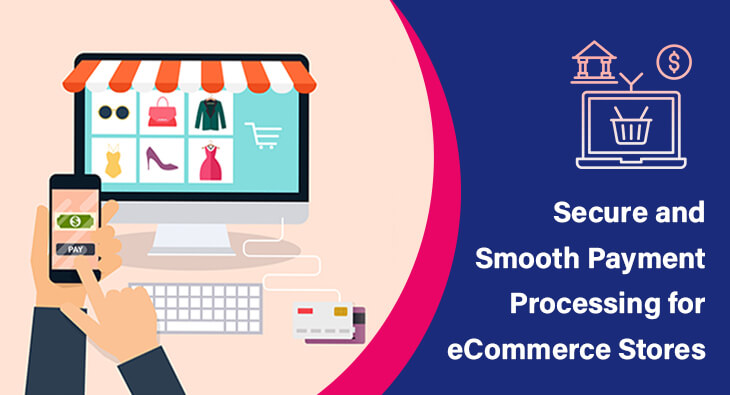Payment processing for eCommerce store is an essential element that can make or break an online business. With the exponential growth of eCommerce, there is a need for reliable, secure, and smooth payment processing solutions to enable merchants to transact safely and seamlessly with their customers. Payment processing is not just about accepting credit cards; it also involves protecting customer data, complying with regulations, and offering flexible payment options to suit various customer preferences. This guide aims to provide an overview of the best payment processing solutions for eCommerce stores to help you make informed decisions and boost your business growth.
The Three Types of Payment Processors
When it comes to payment processing for eCommerce stores, there are three types of payment processors that you need to know about. They are:
1. Merchant Account Providers:
Merchant account providers are payment processors that set up a merchant account for your eCommerce store. A merchant account is a bank account that enables you to accept credit card payments from your customers. Merchant account providers typically charge a monthly fee for this service, as well as transaction fees and other fees.
2. Payment Gateway Providers:
Payment gateway providers are payment processors that act as a middleman between your eCommerce store and your customers’ credit card companies. When a customer enters their credit card information on your website, the payment gateway provider securely sends that information to the credit card company for verification. Payment gateway providers typically charge a per-transaction fee for this service.
3. All-in-One Payment Processors:
All-in-one payment processors are payment processors that provide both merchant account and payment gateway services. They offer a one-stop-shop for all of your payment processing needs and often come with additional features such as fraud detection and chargeback protection. All-in-one payment processors typically charge a monthly fee as well as per-transaction fees.
Each type of payment processor has its own advantages and disadvantages, and the one that’s right for your eCommerce store will depend on your specific needs and budget. It’s important to carefully consider all of your options before selecting a payment processor for your business.
Some Related Blogs
- Mastering the Art of Handling ACH Disputes – Merchant Stronghold
- 5 Proven Strategies to Prevent and Recover Failed Payments
- Payment Orchestration for Seamless Payment Processing
- Mitigating Risks with High-Risk MCC Codes
Key Considerations for Selecting a Payment Processor
Choosing the right payment processor is crucial for any eCommerce store. It can make the difference between a smooth, secure payment process or a confusing, risky experience for your customers. Here are some key considerations to keep in mind when selecting a payment processor:
1. Compatibility with your eCommerce platform:
Ensure that the payment processor you choose is compatible with your eCommerce platform. This will help ensure that the integration is smooth and seamless.
2. Security features:
Make sure the payment processor you select has the necessary security features to protect your customers’ sensitive data. Look for processors that comply with Payment Card Industry (PCI) security standards and use encryption technologies to safeguard information.
3. Transaction fees:
Payment processors charge fees for their services, so be sure to compare transaction fees and other charges from various providers. Keep in mind that the lowest fee might not always be the best option, as some processors might offer additional benefits or have higher fees for additional features.
4. Customer support:
It is important to select a payment processor that offers quality customer support, as you will likely have questions or concerns along the way. Consider how responsive the provider is, what their hours of support are, and whether they offer live chat, phone, or email support.
5. International payments:
If you sell internationally, it is important to ensure your payment processor supports international transactions and accepts various currencies. This will help you avoid transaction fees and other complications when processing payments from customers in different countries.
By taking these key considerations into account, you can choose a payment processor that is right for your eCommerce store and will help ensure a secure, smooth payment experience for your customers.
The Benefits of Using a Payment Processor
As we’ve discussed, payment processors are essential for eCommerce businesses, and there are several benefits of using one:
1. Enhanced Security: Payment processors use encryption technology and other security measures to protect customer payment information. They comply with PCI-DSS (Payment Card Industry Data Security Standard) regulations, which means that the customer’s credit card information is encrypted and secured against theft.

2. Convenient Payment Options: Payment processors offer various payment options such as credit cards, debit cards, net banking, digital wallets, and more. This increases the chances of a customer being able to purchase from your store, as they have more options to choose from.
3. Faster Checkout Process: With payment processors, transactions are completed quickly, and payments are processed immediately, making the checkout process smoother and faster.
4. Reduces the risk of fraud: Payment processors provide an added layer of protection by monitoring transactions and flagging suspicious ones. This reduces the risk of fraud and chargebacks.
5. Lower Transaction Fees: Payment processors offer competitive transaction fees, and this reduces the costs associated with accepting payments.
6. Real-time Sales Reporting: Payment processors provide real-time sales reports and analytics that enable you to make informed business decisions based on sales trends.
The Risks of Not Using a Payment Processor
If you are running an eCommerce store and are not using a payment processor, you are putting your business at risk. Here are some of the key risks that you face when you don’t use a payment processor:
1. Security: Without a payment processor, you are responsible for storing and protecting your customers’ payment information. This puts your business at risk for cyberattacks, data breaches, and other security threats.
2. Compliance: Payment processing is subject to a variety of laws and regulations. Without a payment processor, you are responsible for complying with these laws and regulations, which can be complicated and time-consuming.
3. Reputation: If your customers have a bad experience with your payment process, it can damage your reputation. Without a payment processor, you run the risk of slow or unreliable payment processing, which can frustrate customers and damage your brand.
4. Fraud: Payment processors have sophisticated fraud detection and prevention tools. Without a payment processor, you are more vulnerable to fraudulent transactions, which can result in chargebacks, lost revenue, and damaged relationships with your customers.
5. Cost: Payment processing is expensive, but not using a payment processor can be even more costly. You will need to invest in the technology and infrastructure to securely process payments, and you will need to spend time and resources on compliance, fraud prevention, and customer support.
In short, not using a payment processor can be a major risk for your eCommerce business. By using a payment processor, you can ensure the security, compliance, and reliability of your payment processing, while also reducing your risk of fraud and reputation damage.
![]()
Email us anytime!
Email customer service 24/7
![]()
Call us anytime!
Reach customer care 24/7 at +1 (727) 330-3944


